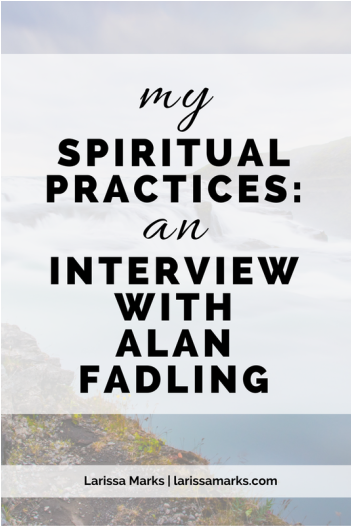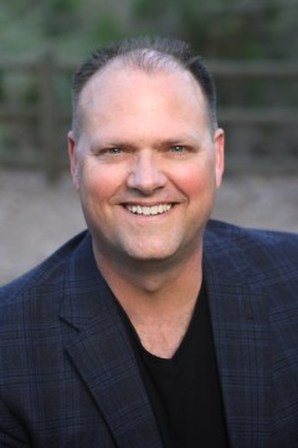|
This is a continuation of "My Spiritual Practices," a blog series highlighting a variety of people through interviews about their spiritual life and practices. I love learning from other people, and in particular, learning how they live out their faith in daily life. Each person being interviewed is sharing an intimate look at their lives. For that, I am grateful. My hope is that these interviews will offer us a snapshot of how different people experience God in their lives, and that they might inspire and guide us in our own unique spiritual journeys. Alan FadlingAlan Fadling (M. Div., Fuller Theological Seminary) is President and Founder of Unhurried Living, Inc. in Mission Viejo, CA, inspiring people to rest deeper, live fuller and lead better. He speaks and consults internationally, as well as nationally with organizations such as Saddleback Church, InterVarsity Christian Fellowship, Cru, Halftime Institute, Apprentice Institute and Open Doors International. He is the award-winning author of An Unhurried Life (IVP 2013), honored with a Christianity Today Award of Merit in spirituality, and a contributing author to Eternal Living: Reflections on Dallas Willard’s Teaching on Faith and Formation (IVP 2015). He is a certified spiritual director, and he lives in Mission Viejo, California with his wife, Gem, and their three sons. How do you connect with God? What spiritual practices and rhythms do you have? Perhaps the most important practice for me over the years has been my monthly days of solitude, silence, and prayer. In my busyness, I need spaces set aside that are not measured by productivity, but simply in terms of relationship and rest. I need space to listen since so much of my ministry is about speaking. I’m also wired as someone nourished by learning, so I love good, solid, spiritual reading. I love finding classics that have stood the test of time and seeing the intersections with my life and my times. What daily or weekly spiritual practices are most important to you? Lately, I’ve returned to praying the psalms in the rhythm of the daily office. I especially appreciate Phyllis Tickle’s The Divine Hours. I’m currently praying through the Autumn & Wintertime volume, but there are also Springtime and Summertime volumes. Sometimes I pray through them alone. Sometimes my wife, Gem, and I pray them together. I usually pray them aloud rather than reading them in my head. They return me to praying the hours during my six weeks of training in spiritual direction at the Benedictine Abbey at Pecos, New Mexico. As for a weekly rhythm, I’ve been deeply grateful for our local church, Holy Trinity Anglican Church in Costa Mesa, CA. I love the integration of the rhythm of the liturgy, of the Christian year, of a focus on spiritual formation in community, of well-rooted preaching and, finally, of the Christ-centered focus of the Eucharist as the high point of the service. Describe the environment that helps you best connect with God. I love connecting with God in solitude, but I also love connecting with God in community. I love the focus of being with God alone, and I love the richness of being alone together with God and with others. Maybe most important for me, it helps to be in a setting in which the focus is on God. I struggle to connect with God in gatherings where human personality and human excitement is the main energy in the room. We Christian leaders can have such a noisy (and maybe even needy) presence when we lead gatherings. It doesn’t help. What tools or resources help you connect with God? Journaling has been an important tool for me. I recently wrote my 9,000th journal page. That’s somewhere around six million words. It’s probably obsessive, but it’s also likely my most important way of praying. Walking, literally, with God helps me remain grounded as well. How have your spiritual practices changed over recent years? Earlier in my journey, I found that I thrived on a lot of input and interaction with biblical and other spiritual content. Lately, I’ve found it more helpful to go deeper with much less content. The way I prayed for others in the past was far more structured and intensive as well. More recently, I’m more likely to set aside some time and trust God’s Spirit to bring to mind those for whom I can pray, remembering them in the presence of God’s grace with gratitude. On days when your schedule changes, are you able to adapt your spiritual practices to fit in with a different environment? I’m a person most comfortable in predictable structures, so surprises or changes in rhythm are always a challenge. For a number of years now, I’ve been seeking to practice God’s presence moment-to-moment. I’ve found this a very portable and flexible practice. Do you practice the Sabbath or spiritual retreat? If so, what does that look like for you? We have not observed a regular weekly Sabbath due to my irregular ministry schedule, but my wife and I regularly set aside monthly overnight retreats at a local retreat center. We get away together. Most of that time is spent alone, but we usually share with one another over meals. I also seek to honor solitude times I’m leading for others rather than “cheating” and using those times to do work. It’s a potential occupational hazard though. What people or relationships contribute most to your spiritual growth? Having a spiritual director with whom I can share my journey and process my experience of God continues to be a critical and fruitful relationship. So much of my work is serving others in this role, so having someone who is listening to my life over time is so good. I also enjoy sharing my spiritual journey with my wife. I’ve been grateful for having shared a common spiritual path with one another. What gets in the way of your spiritual growth? Mostly me. Just about any self-hyphenated dynamic is usually the issue: self-importance, self-seeking, self-deprecation, you name it. What do you do when you get spiritually stuck? Journaling sometimes helps me find my way out of some internal barriers. And though I’m an introvert, I need to talk with trusted friends, share my frustrations, stuck places and such to find perspective. How do you connect with God through life transitions? Funny thing about “transitions.” My wife and I found ourselves using that words so often that we decided maybe instead of calling so many moments a “transition,” we’d just decide we were simply on a journey. Journeys are simply a series of transitions strung together. What is one particular way you’ve experienced God recently? My favorite moments of witnessing God’s presence, God’s generosity, God’s work is when I facilitate a retreat for a group of leaders. So many Christian leaders are so very busy for God that they don’t make time to simply enjoy God. Seeing the peace and joy on their faces when they rediscover and remember God-with-them is an immeasurable treasure to me. What bit of wisdom from your own spiritual journey do you want others to know? Maturity moves in the direction of simplicity. Not necessarily in the direction of ease, but definitely simplicity. Enjoy Jesus. Learn from him. Live what you learn. He’s a genius. If you enjoyed this post, check out these related posts: My Spiritual Practices: An Interview With Eddy Ekmekji My Spiritual Practices: An Interview With Cat Moore My Spiritual Practices: An Interview With Mark Hage Want guidance and inspiration for your spiritual journey delivered to your inbox?
Sign up for my email newsletter Notes From Larissa. Share:
Comments are closed.
|
WELCOMEHi, I'm Larissa. I am an artist and spiritual director on the island of O'ahu in Hawai'i.
SEARCH THE BLOGSUBSCRIBESign up for my email newsletter Notes From Larissa.
TOP POSTSCATEGORIES
All
ARCHIVES
March 2024
|



